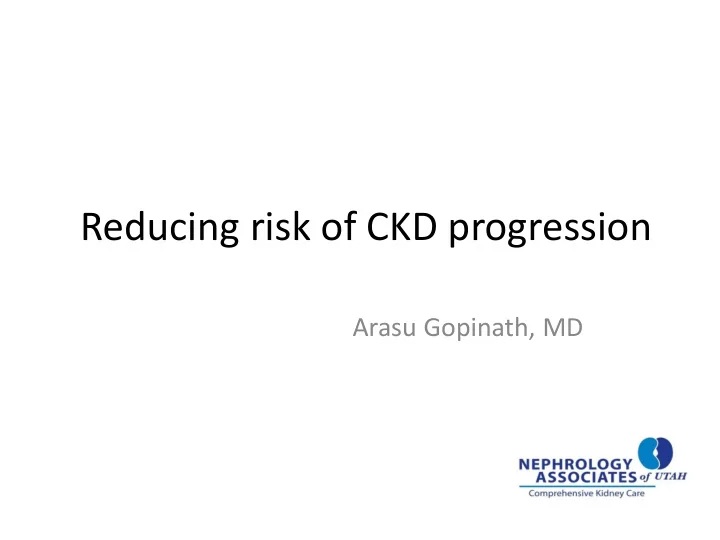

Reducing risk of CKD progression Arasu Gopinath, MD
Relative risk of outcomes in CKD
Delaying CKD progression • BP control and RAAS blockade • All adults with UACR < 30 mg/g, goal BP < 140/90 • All adults with UACR > 30 mg/g, goal BP < 130/80 • ACEI or ARB in all adults with UACR > 300 mg/g • ACEI or ARB in diabetics with UACR > 30 mg/g
Delaying CKD progression • Limiting protein intake ~ 0.8 g/kg/day in CKD 4-5 categories ~ not to exceed 1.3 g/kg/day in order to delay CKD progression • Minimizing AKI ~ avoiding NSAIDs and other toxic drugs (Lithium), avoiding combination of 3+ drugs that impair renal autoregulation, avoiding herbal products and hypotension Contrast induced nephropathy • Stop nephrotoxic agents prior to contrast • In GFR < 60 ml/min, avoid high osmolar contrast, use lowest dose possible, hydrate with saline and repeat labs in 48-96 hours. Avoid phosphate containing bowel preparations • • Glycemic control ~ A1c < 7 Salt intake • ~ < 2.0 gram of Sodium/day, i.e. < 5 g/day of salt • Hyperuricemia ~ insufficient evidence • Lifestyle changes ~ exercise 30 minutes 5 x week, goal BMI 20-25, quit smoking
NSAIDs in CKD • Impair glomerular autoregulation/ ATN • Resistant hypertension and make anti hypertensives less effective • Acute interstitial nephritis • Nephrotic syndrome (Minimal Change Disease and Membranous Nephropathy) • Acute papillary necrosis and hematuria • Edema/ heart failure • Distal RTA and nephrolithiasis • Hyperkalemia • Chronic use associated with CKD and its progression
CKD Development Team Co-Chairs • Wayne Cannon • CKD Medical Director – Arasu Gopinath • PCCP Operations Director – Sharon Hamilton • Regional specialty representation (North, Central, South, SW) – generally the Dialysis Medical Director (nephrologists) • Harry Senekjian – Northern Region • Jeff Barklow – Central Region • Terrence Bjordahl – Central Region • Terry Hammond – South Region • Carlos Mercado – SW Region • PCP representation • Jeff Twitchell – Central Region (North Salt Lake) • Roy Gandolfi – Affiliates / SelectHealth • Tom Clark – North Region • Paula Haberman – Central Region (South Salt Lake) • PCCP Guidance Council : Michael Visick, Donna Barhorst, Mark Lewis, Anne Pendo, Tim Johnson, Gordon Harkness, Mark Greenwood, • Marty Nygaard ( PCCP Guidance Council but they do not attend) • Dialysis Svcs Ops Director – Ray Morales • Dietician – Joy Musselman • Compliance – Mary Zollo • Integrated Care Management – Teresa Garrett • Education team - Pending • Pharmacist - Tyson Brooks • Analyst – Jonathan Anderson • Data Manager - Brett Reading •
The IHC database
CKD risk chart by region
CKD risk chart by physician
CKD CPM
CKD Flash Card
Patient handouts in iCentra
Likely prompts in iCentra/ CPM
Questions 1. Risk for progression of CKD is highest in the 60 year old non diabetic male, when a. eGFR is 70 and UACR is 100 mg/g b. eGFR is 60 and UACR is 500 mg/g c. eGFR is 50 and UACR is 20 mg/g d. eGFR is 40 and UACR is 10 mg/g
Questions 2. Avoiding NSAIDs in CKD is part of the Choosing Wisely campaign. NSAIDs can worsen CKD in all of the following ways except: a. Acute interstitial nephritis b. Nephrotic syndrome c. Resistant hypertension d. Distal RTA e. Proximal RTA
Questions 3. Which of the following interventions is least likely to retard progression of CKD? a. Limit protein intake to approx 0.8 g/kg/day in CKD G4 b. Correct serum Bicarbonate to greater than 22 c. Limit salt intake to less than 5 grams a day d. Control Uric acid level to less than 6.5
Questions 4. Which of the following combinations is likely to have the most impact on proteinuria? a. ACEI + Thiazide b. ACEI + ARB c. ACEI + DRI (Aliskiren) d. ACEI + ARA (Spironolactone)
Questions 5. All of the following are recommended interventions to reduce contrast induced nephropathy in CKD G3-5 except? a. Stop Metformin and diuretics temporarily b. Avoid isosmolar contrast agents c. Hydrate with saline pre and post contrast d. Measure Creatinine/ eGFR 2-3 days post contrast
Recommend
More recommend